- Home
- Deepak Chopra
Muhammad Page 7
Muhammad Read online
Page 7
He called his sons together and told them that one must die the very next day. But which one? The room fell silent. The sons were as superstitious as the father. They knew the oath had to be carried out. The next day they all gathered inside the Kaaba beside the statue of Hubal. Muttalib believed that if his sons drew lots, Hubal had enough power to select the right one. As you can see, Muttalib was fickle. One day he shivered before the might of God, but when it came to practical affairs, throwing the choice onto an idol’s shoulders was easier. He had been paying off Hubal for years.
The sons each wrote their name on an arrowhead and threw the arrows into a quiver. Muttalib reached in and, begging Hubal for guidance, pulled one out. The name on it was Abdullah’s. The other nine sons, needless to say, were relieved, yet no one expected that Muttalib’s favorite son would ever be drawn. When the news was announced outside the Kaaba, the gathered crowd began to shout, demanding Muttalib to foreswear his oath. The wife who had borne Abdullah was named Fatimah. She was popular with the common folk, and most of the crowd came from her clan.
Muttalib heard the vociferous protestations with a heart of stone. He had picked a spot between two large idols where he would shed Abdullah’s blood. With his unsheathed knife he made his way through the mob. Abdullah followed, white as a ghost. Hands plucked at garments; cries filled the air.
Pardon me if this tragic moment suddenly turns comic, but at the last minute a voice in the crowd shouted, “The gods love money. Pay them off. You can afford it.”
Muttalib whirled around in a rage, trying to spot the one who had cried out so insolently. But a tiny voice in his head whispered, It’s not such a bad idea. You’re rich, and you love Abdullah more than anyone else in the world.
With a great show of reluctance Muttalib agreed to spare Abdullah, but there were two details to settle, for now this had turned into haggling. How much should be paid to ransom his son, and who should decide that the price was fair? Since Fatimah’s clan had raised such a ruckus, Muttalib forced them to add their money to his. As for an arbiter, it was decided to seek the advice of Shiya, a woman soothsayer who was the most trusted among the various shamans, fortune tellers, astrologers, oracles, and diviners trusted by the Quraysh.
Shiya was a recluse living in the faraway town of Yathrib. The journey had its perils, and Yathrib was traditionally a rival to Mecca in prestige and power. Even so, Muttalib made the trip with a light heart, overjoyed to circumvent his bargain with Allah. It wasn’t a good sign that Shiya had just left town when he arrived, but Muttalib brushed this omen off. He traveled a hundred miles north before he found her, an old crone shuttered inside a hovel. She refused him entrance, but after two days of his wheedling Shiya promised to divine an answer.
Her answer was this: “In your tribe, Abdul Muttalib, if a man kills another man, the victim’s life is worth ten camels, which are paid to his family. Payment in camels will satisfy the gods in this case too.”
Muttalib had his doubts that Allah could be bribed with ten camels, but before he could object, Shiya stopped him. “Take two arrows and go before Hubal again. On one arrow write ‘Abdullah’ and on the other, ‘camels.’ Draw out the arrows as you did before, and every time your son’s name comes up, add ten more camels to the price. Do this until the word ‘camel’ is drawn, and you’ll have the price the gods demand.”
Muttalib and his companions returned to Mecca, and a great crowd gathered for the drawing, laughing and carousing as if this were a feast day. The first arrow that Muttalib drew had Abdullah’s name on it, so the price was ten camels. He drew again. Abdullah’s name appeared. The price was now twenty camels. The crowd’s cheerful banter turned to silence and finally grim-faced awe. Abdullah’s name was drawn ten times in a row. The price was a hundred camels, almost the wealth of a well-to-do trader. Muttalib was richer than that, but he blanched.
At last the word “camel” came up on the eleventh try, but by then Muttalib was dejected and overwhelmed with doubts. He stood up before the crowd and raised his hands.
“Draw again,” he cried. “If Abdullah’s name comes up three times in a row, I will obey the soothsayer. If not, my duty to God forces me to keep my bargain.”
This was terrible news to Fatimah’s clan and to Abdullah, of course, who let drop a cup of wine he had raised to his lips.
Despite the hue and cry and the horror on Abdullah’s face, Muttalib stood firm. All along he had mistrusted Shiya, suspecting that she might be toying with him because her allegiance was to the tribes of Yathrib.
The arrows were drawn again. One, two, three. An exultant cry rose up from the crowd, because Abdullah’s name had appeared on all three draws. His life was spared, and his father paid a hundred camels to the priests at the Kaaba in the name of Hubal.
When I reached this point in my tale, I glanced at Muhammad, who had grown very still. No one had recounted these details to him, and he was steeling himself, since he already knew that his father’s reprieve led to no happy ending.
I went on. To celebrate his escape from death, Abdullah was allowed to marry, and at age twenty-five he took Aminah, the daughter of a prominent family in Mecca. They spent three days ensconced in her father’s house after the wedding ceremony. But Muttalib had been harboring dark thoughts amid the celebrations. He called Abdullah to him and told him that he should travel by caravan to Syria. The young bridegroom was baffled. Why should he leave? He had only been married a week. The young couple were enjoying the first sweet taste of their love.
Muttalib gave no reasons. He forced his will upon Abdullah, as was his right as the young man’s father. With tears and rending cries Aminah ran to the gate clutching Abdullah’s robe as he left for Syria. They had been together as man and wife for only two weeks. Abdullah knew that his father was daring God to harm him. It was the old man’s way of testing if he had truly fulfilled his oath to Allah. That, and Muttalib’s fear that Abdullah’s happiness was too great. Between having his life saved and his bliss with Aminah, Abdullah was tempting the gods to destroy him.
“And they did,” said Muhammad interrupting.
Abdullah never made it back home. The trading in Syria went well, but his yearning to be back with his bride was strong. Retracing his steps, he passed through Yathrib. There, where Shiya had saved him from fate, Abdullah fell ill with a malady no healer could treat. He died a few days later and was quickly buried, in case his curse happened to be contagious.
“I don’t tell you all this to add to your sorrows,” I said. “You had to know these things. Abdullah had a sixth sense. He knew that God’s will cannot be bargained with. Just as we accept life from Allah, so must we accept death, as a gift that is not ours to question.”
Muhammad hadn’t waited for the end of my tale before springing to his feet. He began to pace restlessly. “You want to curse my whole family? You might as well with this tale.”
A voice told me to keep quiet. Nothing hurt more than Muhammad’s anger. Yet stinging words poured from my lips. “This has nothing to do with me. Your mother took you on a trip when you were six. Where? To that same town, Yathrib. She died on the way home, just like her husband. Open your eyes. See the will of God. Accept it.”
Muhammad remained silent, but his eyes told a story of defiance.
I continued. “My son, you are fated. I have prayed over you, and God has prepared you for greatness. A great man learns through calamity. It fixes his gaze on heaven, if he is wise.”
The color rose in Muhammad’s cheeks. “You made my father and his father out to be mere dreamers.”
“Sometimes dreamers see more than ordinary people,” I replied. “Abdullah fled his young bride even though it broke her heart. He ushered himself off the scene before it was done for him.”
I had gone too far. Another youth might have tightened his fists and started swearing. Muhammad stopped pacing and gazed at me. I put my hand on his shoulder to calm him.
“I’m saying that all men must die, but some may go
to their deaths willingly as a sacrifice. In that way they become true servants of God. We never know the truth until it is revealed.”
Muhammad pulled away. He was too upset to listen and ran toward the courtyard gate. I didn’t call after him. Without using the word “prophet,” I had opened the possibility of a special fate. Muhammad didn’t return the next day, or the day after that. He avoided contact, only nodding at me if our paths happened to cross at the inns or near the Kaaba. His gaze was strangely guilty. It would be months before he relented and asked to see me again.
The night I revealed Muhammad’s destiny to him I couldn’t sleep. I pulled out a page from my hidden cache and pointed a finger in the dark. When I brought it close to the lamp, the words beneath my finger brought consolation.
For strait is the gate, and narrow is the way that leads to life, and few there be who find it.
5
BARAKAH, THE AFRICAN SLAVE
I don’t know if hell has three circles, but Mecca does. The first ring is where the rich live, the second is for those who dream of getting rich, and the third is for the dregs, who wait upon the first two. I live in the worst, the farthest circle away from God. All around me, desperation is a way of life. In a drought I’ve seen children squat to sip from the sewer. The rich would rather kiss a leper than come to the filthy alleys where our crumbling hovels stand. They crowd around the Kaaba, their mansions and courtyards shouldering each other aside like old women grabbing for peaches in the bazaar.
Is my head less blessed, because it’s not covered with silk?
“Barakah, I trust you. You’re the only one I trust,” says Muhammad.
He comes to see me. That’s proof that he’s not rich yet. Ever since old Muttalib died, their clan has fallen. Slaves found themselves thrown out on the street, begging for a master to feed them. It’s shocking how the vultures closed in, stripping the Hashim of power, forcing them into humiliation. Muhammad did what he had to. He began to trade his small fund, and that has served him well. I never thought he’d reach twenty without begging for help.
His visits to me aren’t planned. He drops in on hell when the mood strikes him. God seal my mouth for saying such things. He loves me—that’s the real reason. I was the first person to hold him when he was born. I belonged to his mother, the lady Aminah, in those days. I’ve been passed along so many times I couldn’t name all my owners. I’m like a water skin that won’t be thrown out until it leaks its life away.
One day I look up from sweeping the blown dirt and leaves from my last master’s courtyard, and I see an amazing sight. Muhammad leading a caravan, and so young. An older merchant weary of travel trusted him to go in his place. When he spots me from atop his camel, he gives me a serious nod. I know Muhammad wants to dismount and embrace me, but he can’t, not in front of men he gives orders to. In the back of my mind I think, Your father never returned, your mother never returned. Maybe the curse ended with them.
And he did return. Word spread that Muhammad could be trusted to keep his head in dangerous corners. He will soon have the money to buy me for himself.
“Money?” I laugh. “No master will give me shelter anymore. You can have me for free.”
Muhammad winces, but we both know what is lacking. He first needs a wife. A female slave in a single man’s house is scandalous. Everyone would know what she’s really there for. Gossips would say that he likes them old.
“How did you become so respectable?” I tease Muhammad.
“Don’t worry. It’s a disguise,” he jokes back. Walking past him in the street, you see Muhammad’s hair and beard cut like those of someone who’s prosperous. He wears a cloak dyed in rich blue and trimmed with braid. Only I know what he is. He allows me to stroke his cheek to feel how perfectly the razor has done its work. And why not? I ushered him into this world, a squealing naked creature. His respectability ends at my doorstep.
“You’ve come to save me,” I murmur. “You’ve come to save everybody.”
“Don’t be foolish,” he replies. “I’m as helpless as anyone, and even more confused.”
I shake my head. “Wine ferments before it grows sweet. That’s what you’re doing. The sweetness will come.”
I think our intimacy pleases him. I wouldn’t be in danger if I shouted about it from the rooftops. That’s one advantage of being invisible. All poor women are invisible here, except in bed. For half an hour they are divine creatures then. What does that make me, twice as invisible? I was born a slave, and I sleep alone.
The memory of Muhammad’s mother haunts me. Aminah worshiped Abdullah beyond the grave. The gods were displeased; Abdullah was her only idol. She took that final trip beyond Yathrib to weep over the pile of stones where they buried him. When she turned her steps back to Mecca, a full month later, grief had destroyed her health. I was walking ahead of her donkey when I heard Aminah say, as softly as a frightened child, “We stop here.” She felt sick. Walking beside her, Muhammad hung his head.
I felt a shiver run down my spine. Two women and a six-year-old boy pitching a tent alone in the desert? We got it up somehow, and Aminah crawled inside, as if the tent’s folds could protect her from a trembling fever. She died so quickly. I barely had time to send Muhammad out of the tent, but he couldn’t stand it and ran back inside, just in time to fling himself on his mother’s unconscious body. We wailed together like wounded animals, then buried her with our own hands. The whole way home the boy kept staring at the dirt under his torn, ragged fingernails. The dirt of his mother’s grave. What a horrible thing to set your eyes upon.
I had my own horrors. Watching a young woman die like that, burning up in my arms, was worse than seeing your house burn down. This was a soul turned to ashes. Aminah begged me to take care of her boy. I did what I could. For a while it was possible. Old Muttalib took me into his house. I didn’t have to live in hell then. I had a tiny room at the back of his rambling mansion. He loved Muhammad so much that he even pushed out an old crone who had inhabited the room like a forgotten ghost. I shudder to think of where she went. But Muttalib died, and his sons lost the power. I cried to lose Muhammad, who was only eight. He went into Abu Talib’s house, a small dwelling where the clink of gold was rarely heard.
I can’t remind Muhammad of these things or he blushes with shame. “I should have gone with you on to the street,” he says. However, we both know that was impossible.
When he arrives in his fancy blue robes, the braid dragging in the dust because he doesn’t pay attention, my boy brings me bread, olives, and a small clay jar of oil. I don’t dive into it. The way the vulgar rich tear at their food disgusts me. I taught Muhammad better, and I’ve seen him sit quiet and hungry while Abu Talib’s sons clawed at the dinner bowls like hyenas. With the food Muhammad brings, we sit opposite each other on a tattered rug and nod politely for the other to go first.
“Here,” he says once, holding out a small glass vial. You didn’t even have to take out the stopper to smell what it was. Attar of rose. I thought I’d faint from intoxication.
“Open it,” he urges, when I shove the vial into my underblouse.
“Don’t be silly. It will attract flies, and I have enough as it is.” But I was just trying to keep from crying in front of him.
As Muhammad has grown, he has become more troubled. One day I ask him about this. “To be empty is to be miserable,” he says, which makes no sense
And now the bad times have come. People are afraid. You have to know how to read the signs. One day I’m walking along and what do I see? The sand outside a rich man’s gate is bloody. It’s not brown blood, the leftovers of a street fight. It’s shockingly red and fresh. Usually everyone looks away when there’s blood. To stare might mean you’ve got an opinion about the fight, and anyone with an opinion has taken sides, a dangerous thing to do in Mecca.
On this day I hear buzzing in the air. People aren’t just staring; they’re talking angrily, and I see something else. The trail of blood leads into the rich
man’s courtyard. This wasn’t just a common knife fight between two young hotheads.
I know instantly what it means. The balance has been wrecked. The rich are protected from losing their blood, unless the tribes can’t settle their differences behind closed doors. Once there is chaos, no one is safe.
“Come away. You can’t stay here,” a voice says, and I feel someone pulling at my elbow. By now the buzzing voices are thicker, like flies around a dead animal, but I see that it’s Muhammad, and I let him drag me off.
“I’ve seen riots,” I say, because, to tell you the truth, I wanted to stay and watch. Not for the sake of more blood. I’ve seen women bloodied by their husbands more times than I can remember. All this cruelty is a kind of vanity, if you ask me. A man brags in the inns that he’s a bull in bed when his wife knows he’s a rabbit. So she has to pay. A crazy world, when one gets punished for another’s shame. I wanted to stick around to find out who the new victims were going to be. If the clans are jockeying for power, the losers aren’t the ones you want to serve.
When he gets me to a side street, Muhammad looks worried. He warns me not to go near that house again. I shrug. It doesn’t matter that much where you go when you’re invisible, but he repeats the warning and tells me there are three other houses I must not be seen around.
“Everyone watches. They know who goes through those gates,” he says.
“I’ll go where I please,” I say. Which is a boastful way of reminding him that wherever my master sends me, I have to go. I have to obey.
“You won’t be sent there anymore,” he replies. His voice is grim, but he won’t explain what he means. As we part at the corner, Muhammad leaves me with strange words: “The dawn doesn’t come back to awaken us twice.”
I feel prickly all over when he says that, but before I can question him, he has melted into the crowd. Now, you’d think something dark was afoot. Maybe one night the vigilantes will raid a particular clan and wipe out all the young males. It’s happened before, and since they sometimes get careless and slit the throats of a few slaves, I keep to my house the next few nights, begging off that it’s my unclean days of the month.

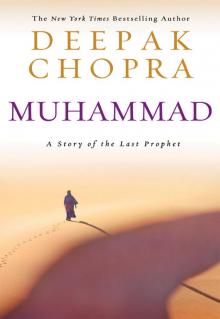 Muhammad: A Story of the Last Prophet
Muhammad: A Story of the Last Prophet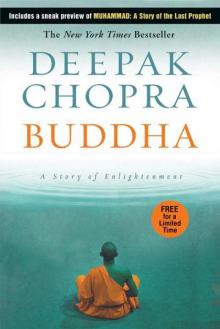 Buddha
Buddha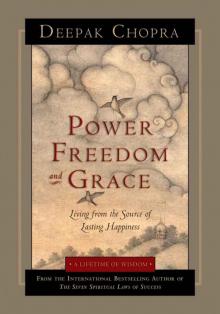 Power, Freedom, and Grace
Power, Freedom, and Grace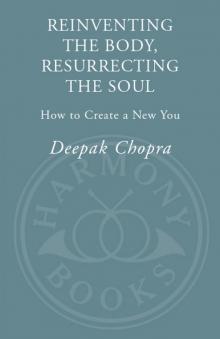 Reinventing the Body, Resurrecting the Soul: How to Create a New You
Reinventing the Body, Resurrecting the Soul: How to Create a New You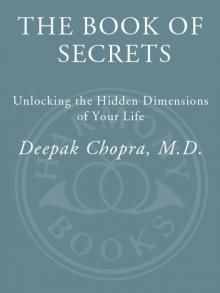 The Book of Secrets: Unlocking the Hidden Dimensions of Your Life
The Book of Secrets: Unlocking the Hidden Dimensions of Your Life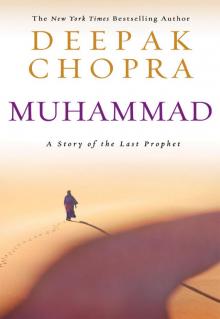 Muhammad
Muhammad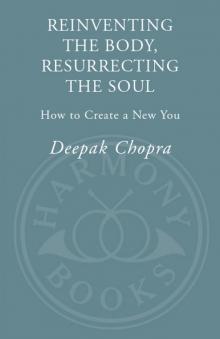 Reinventing the Body, Resurrecting the Soul
Reinventing the Body, Resurrecting the Soul